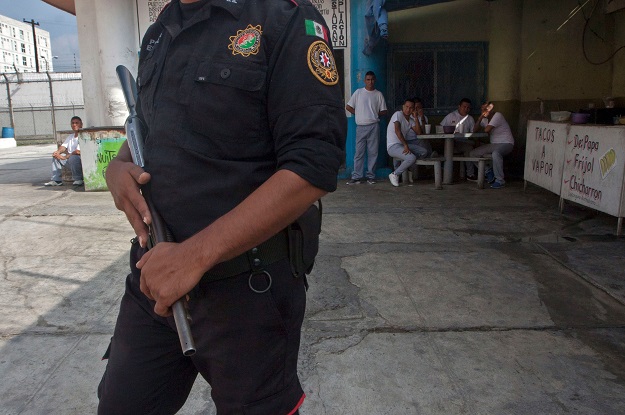MEXICO CITY – After yet another year of record violence, Mexican government officials are grasping for new ways to empower the judiciary and push back against organized crime. But draft reform proposals leaked earlier this month – and set to be unveiled officially on Feb. 1 – would endanger due process, the presumption of innocence, judicial independence and impartiality, and pose risks to human rights. The coming congressional debate over the final proposals – and what to do about the impunity that has so weakened Mexico’s rule of law – will be among the most vital in the country’s recent history.
The leaked legislative package includes reforms to 14 Articles of the Constitution and amendments to four federal laws. It would replace legislation regulating the attorney general’s office and the criminal code, and introduce a civic culture and justice law. The overall effects of these changes is not entirely clear, but they raise five key concerns.
First, the proposed laws would expand a legal instrument that allows authorities to detain suspects accused of participating in organized criminal activities while the investigation against them is still ongoing. International organizations have already noted how Mexico’s current laws violate the presumption of innocence; this new plan would broaden the application of pre-trial detention to all crimes. Suspects would face legal detention for up to 40 days, even before prosecutors gather any evidence against them.
Second, the draft reforms would nullify current rules that consider illegally obtained evidence (e.g. through torture) inadmissible in court. The draft plans would overturn this provision in case of extenuating circumstances, even though doing so would incentivize human rights violations.
Third, the draft proposes special courts that would oversee corruption cases against federal judges and magistrates (a particular focus of the current administration). The proposal raises serious questions over judicial impartiality and undue government influence over the courts, as the new presiding judges – who in turn would pass judgment on members of the judiciary itself – would be nominated by the president and appointed by the Senate, where the administration holds majority power.
Fourth, the draft measures would weaken protections against potential police and prosecutor abuse. Currently, the judiciary monitors potential violations of defendants’ rights at different stages of criminal proceedings. The proposal would reduce the number of judges participating in that process, and supervising judges would no longer play a role in evaluating pre-trial evidence. Instead, the same judge that sees evidence during a trial would be the one who had evaluated it for permissibility beforehand. The same proposal would also impact defendants’ privacy, as a judges’ ruling would no longer be necessary to conduct communications surveillance in cases dealing with electoral or tax crimes. Similarly, prosecutors would no longer need authorization from the judiciary to detain suspects caught in the act of committing an offense.
Finally, the proposals would incorporate the “presumption of responsibility,” a new concept in Mexican jurisprudence that would apply to individuals who refuse to allow forensic experts to perform tests on them personally. In those cases, the presumption of responsibility would imply that those individuals are responsible for the crimes for which they are accused.
On the whole, these legislative proposals could signal to some that the government is ready to get tough on crime. But in reality, citizens would become more vulnerable to state surveillance and pre-trial detentions, while prosecutors would be held less accountable than before – all without the advertised gains on security.
The proposals would risk derailing years of institutional change and investment both at the national and state level related to Mexico’s transition to its current adversarial criminal system. It would throw away the resources spent over the past decade. These include over 18.3 billion Mexican pesos between 2008 and 2018, as well as aid received through the Mérida Initiative during the same period. U.S. development agencies such as USAID refurbished over 120 courtrooms in 21 states and trained more than 9,000 officials and 100 judges.
The proposals are based on the false narrative, proffered by senior cabinet members and the attorney general himself, that the adversarial criminal justice system has triggered a “revolving door” that sends criminals back into the streets. The thinking goes that if the adversarial system and supposedly lenient laws protecting defendants have coincided with a surge in crime, then restricting rights will offer some solution.
Homicides cases have in fact swelled each year since the implementation of the adversarial system in 2016, rising from around 25,339 in 2017 to 35,588 in 2019, the most violent year in Mexico’s history. But there is no proven link between the implementation of the system itself and the soaring violence. On the contrary, operational problems seem to be behind impunity. The main problem is the lack of investigative capacity. Figures for 2018 show that out of 166,400 open investigations, the Attorney General’s Office pursued 66.3% of the cases. And of those, over 80% were either archived or the prosecutor decided not to press charges. As a result, only 1 in 10 federal crimes under active investigation was effectively prosecuted that year.
Such deficiencies stem from excessive workloads, lack of oversight, and incentives to close investigations quickly. The problem, however, does not lie on the design of the adversarial justice system itself. The tools needed to close cases are not the ones included in the legislation. That means not only that the reforms laid out in the government’s draft would have a detrimental effect on the justice system, but that they are also based on a flawed diagnosis of fundamental problems.
The current security situation in Mexico does call for reform, but those changes need to be made responsibly. First, the government should focus on strengthening the current criminal justice system. Second, authorities should prioritize which crimes they want to tackle and distribute resources accordingly. The Attorney General was expected to present his criminal prioritization plan on January 18th but failed to do so. Finally, for the adversarial justice system to work properly, it is necessary to take police forces seriously and invest in their training and investigative capabilities, but the current proposal seems to weaken the police’s role in criminal investigations.
Fortunately, there is still time for Congress to debate and improve the proposed reforms. After the draft bills were met with immediate pushback from civil society and security experts, Attorney General Alejandro Gertz unexpectedly delayed the official presentation of the legislation, planned for Jan. 15, until after Congress resumes at the end of the month. That delay may signal that the government is willing to walk back some of its most controversial plans. For their part, senior members of the governing Morena party urged patience with the legislative package.
Opponents of the proposals should indeed take advantage of any opportunity to build a case for more responsible change. In that, safeguarding the adversarial criminal justice system will be essential – a failure to do so would almost certainly lead to more violations of human rights. Rather than rubber-stamping the government’s plans, legislators should use the impulse for reform to address key issues hindering Mexico’s justice system. Not doing so will only worsen the country’s dire security crisis.
—
Novoa is the director of the justice program at México Evalúa.








